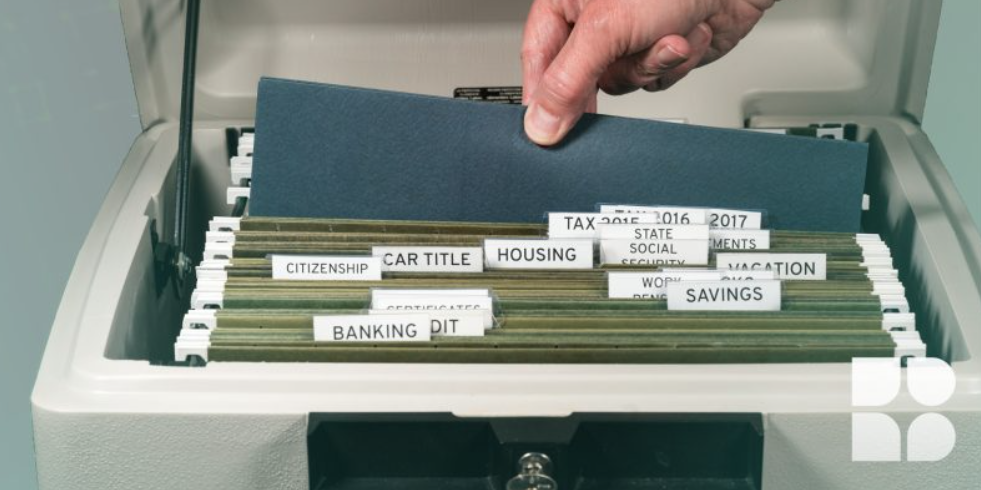IT’S NOT OVER ‘TIL IT’S OVER: THE CASE FOR TAX RECORD RETENTION

When tax season is over, most people want to forget about it. But after all the discussion with your accountant, after everything is paid and filed, there’s still one critical step, tax record retention.
Keeping track of your tax records is as essential as filing them on time. In this post, we’ll tell you the benefits of hanging on to those records (there’s a bunch!), how to store them, and for how long.
Let’s get started.
Benefits of tax record retention
Tax record retention’s spot on the chore list is probably right up there with cleaning the gutters. Still, like any chore, tax record retention has benefits that make it worthwhile. One of the biggest is peace of mind in case of an audit. If you are audited by the IRS, it won’t be easy to prove your statements without the proper documentation. If you don’t have the records, it will take a tax attorney longer to prove your statements. That’s an added expense that can easily be avoided.
You may also need your tax records to apply for loans, and it makes working through FAFSA documents easier. Also, if you want to file an amended return, good tax record retention is a must.
Tax records can also help you improve tax planning if you are a business owner. For example, looking at last year’s tax records can help you estimate their impact on this year’s bottom line. Then, you can put those estimates into long-range planning financial tools to make better economic forecasts for your company.
Consequences of not keeping good tax records
Not keeping good tax records tends to have a snowball effect, especially for businesses. That’s because one of the most common consequences of poor record keeping is overpaying or underpaying payroll taxes. If you overpay, then you potentially throw money away. If you underpay, you run the risk of audits or financial and legal penalties.
The headlines are littered with stories of people who had to pay fines or serve prison time over payroll tax issues. Reading between the headlines, you can see many problems could have been avoided if better records had been kept. When you factor in damage to your reputation and attorney fees, poor record keeping can be expensive indeed.
So, what type of tax records should you keep?
Individuals should keep income statements, including W-2s and any Form 1099s. Expenses and deductions from receipts, invoices, alimony paid, charity statements, and gambling losses are helpful, too. Homeowners should hang on to closing statements, purchase and sales invoices, insurance records, and property tax assessments. And anyone with a retirement account should have records for IRA contributions (Form 5498), nondeductible IRA contributions (Form 8606), 401k or 403b statements, distribution records, and annual statements.
It gets more involved for business owners. Broadly speaking, it’s best to hang onto all gross receipts, including cash register tapes, receipt books, deposit information, invoices, and Forms 1099-MISC if you employed a contractor for your business. From there, keep track of business-related expenses, including travel, transportation, entertainment, and gifts. Also, keep records of all assets. Last, but certainly not least, you should keep all your employment tax records in order.
All these areas could take an entire blog post to explain, so it is best to consult with a CPA about what records your business needs to keep.
Now, how long should you keep these records? Let’s dig into that now.
How long to keep records for as an individual and a business
For individuals in normal circumstances, three years is long enough to retain tax records. That’s about as far back as the IRS will go in an audit in normal circumstances. However, if you accidentally underreport income or want to write off a loss from a poor-performing stock, it’s best to hang on to the records for at least seven years.
For businesses, the length of time depends on the record type. W-2s, payroll tax returns, and retirement plan agreements are all best kept indefinitely. Workers’ compensation benefits and payroll tax records should be held for 10 years. You should hold payroll checks and records, time and attendance reports, and medical benefit records for seven years. For a more comprehensive list, you can reference one of our earliest blog posts here.
Again, there are several variables to think about for individuals and businesses. So, talk to a CPA to find the best way to handle your situation.
The best way to keep tax records
There’s no law governing how to keep records. The IRS only cares that they can be accessed easily and are held as long as needed under tax statute limitations.
A fireproof safe or safe deposit box is your best option if you prefer to hold onto paper copies. Another option is to store them electronically. You’ll save room and will be able to hold more records longer.
The bottom line
Tax record retention is a chore, but reaping the benefits of good recordkeeping and avoiding the negative consequences is enough to make it worthwhile. Talk to a CPA and get a good plan of what to hold and how long to hold it so you can reap those rewards for yourself.